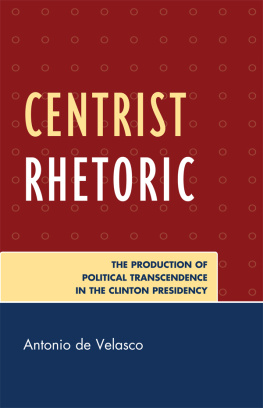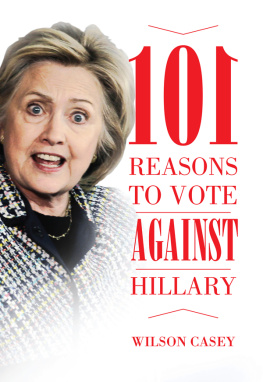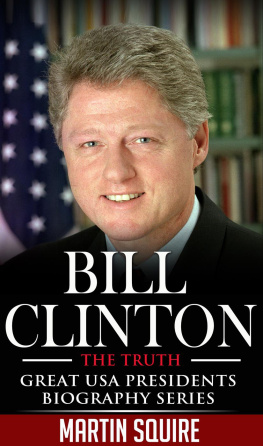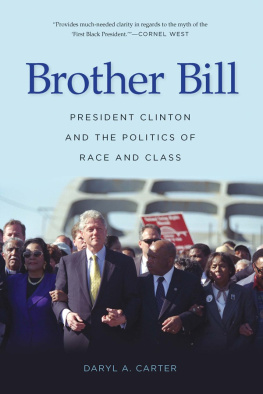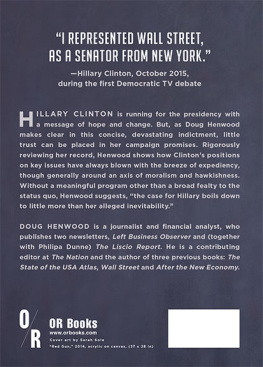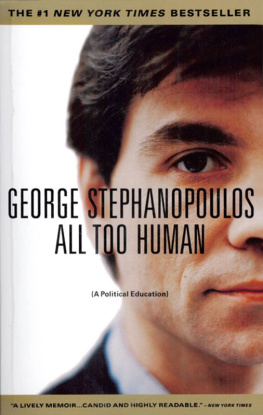Introduction
On December 11, 1996, Bill Clinton addressed a packed gathering of the Democratic Leadership Council (DLC), an organization founded eleven years earlier by Democrats concerned with their partys increasingly marginal political identity. The president defined his recent reelection in clear terms. Though he was the first Democrat reelected to the high office since Franklin Roosevelt, Clinton did not describe his victory as a mandate for his party. Though he had ushered through an unprecedented trade agreement, reduced the federal budget deficit, presided over a time of relative peace, helped to calm the nation after a domestic terrorist attack, and signed into law an historic and bipartisan reform of its welfare system, he did not define his win as an affirmation of his strength as a leader, though that point was certainly implicit. Rather, Clinton cited his support from voters as the reaffirmation of the strength of a political center that was fundamentally pragmatic and democratically essential:
The clamor of political conflict has subsided. A new landscape is taking place. The answer is clear: the center can hold, the center has held and the American people are demanding that it continue to do so.... This is an irreplaceable moment for breaking new ground in America. All our political leaders say we will work together. The public wants us to work together. And our progress demands that we work together. I stand ready to forge a coalition of the center, a broad consensus for creative and consistent and unflinching action.... Anchored by our oldest convictions, strengthened by our newest successes, certain of our national purpose, let us go forward from that center to build our bridge to the 21st century.
While he equated the timing of his win over Senator Bob Dole with an irreplaceable moment in U.S. political history, Clinton implied that the center to which he referred was still fragile; it had held but required work in order to continue to do so. The primary challenge of his second term, Clinton argued, would be to translate the centripetal political force sparked by his triumph into action.
Clinton had routinely traded harsh attacks with conservatives in Congress and elsewhere since assuming office in 1993. Many of his adversaries on the right questioned the very legitimacy of his presidency and sought to derail it at nearly every turn. And yet, Clinton used the image of a center free from such political calculation to argue that his victory was a plea from voters for an end to all that. He offered a vision of citizens demanding that their political leaders remain close to the center in order to transcend their differences. By electing him president, Clinton suggested, Americans had rejected the centrifugal partisanship of left and right that would ostensibly make creative and consistent action impossible. In such a formulation, the center served to make vivid the need for, as Erik Doxtader has put it, a middle of public life that mitigates against the kind of extremism that can make us insensitive to the nuances of public interaction. Indeed, as Clinton put it, the DLC had helped him to create a new center... a place where throughout our history, people of good will have tried to forge new approaches to new challenges. The center, both new and old, timeless and of the moment, it seems, is also fundamentally American.
From a rhetorical perspective, we can observe that Clinton is not merely describing a new center in this speech. He is using it as an inventional metaphor to give meaning and persuasive force to his argument. He is using it to produce an epideictic appeal that defines his fellow citizens in terms of a democratic ethos of consensus-seeking deliberation. He is using it to give rhetorical presence of a transcendent public spacea center that can potentially include all who are willing to compromisein which the possibility of getting things done politically always remains in spite of differences of party.
To claim, as Clinton does, that the political center can hold is thus, among other things, to reassure ourselves (rightly or wrongly, depending on the situation) of something crucial to almost any understanding of democratic politics: The possibility that in the absence of coercion a free people can still transcend their divisions to arrive at general agreements on matters of mutual concern. What I will call centrist rhetoric is the name for a recurring symbolic action that maintains this possibility of transcendence. It does so, I will show, by constantly evoking a space beyond politics to invent what are unmistakably political arguments, that is, strategically driven arguments about contested matters of power, policy, and identity. Inherent in the inventional potential of the center is hence an irony, indeed a productive paradox, that is lodged in its fundamental rhetorical makeup and that serves as the leitmotif of this book. The call for transcendence arouses my curiosity as a rhetorician precisely because it is always alloyed with the strategic goals of those who issue it. Centrist rhetoric is always dependent, in other words, on an appeal to the partial, and thus potentially divisive, passions and perspectives of those to whom it is addressed. As the New York Times reporter covering Clintons speech to the DLC put it, the occasion was used not only to call for a rapprochement with Republicans, but to celebrate the success of the centrist strategy that helped re-elect him.
The reporters comments stress the strategic rhetoricity of the center as a trope of partisan transcendence that, for Clinton, simultaneously served his partisan ends. That this common trope for transcendence is always implicated in the partisan textures and motives that inspire its use (and that it characteristically denies) renders it somewhat strange. The productive and prominent role of the center in contemporary political discourse, in turn, raises larger questions about the contradictory fashion in which calls to transcend left and right increasingly shape our most salient political controversies
The political center is consistently identified with a site at which ideological controversies are soothed, but finds its only home in an increasingly unbalanced global political ecology that resembles, in Kenneth Burkes tragicomic coinage, Babel after the Fall. Along these lines, the political actor who embraces the center will construct a vision of potential unity that remains apparent and unfinished in spite of its claim to be real and complete. Such a vision seemingly includes all, but actually cannot include all, if only because of the inevitabilities of choice in any democracy, not to mention the causes of faction which, as James Madison eloquently argued, are sown in the nature of man... everywhere brought into different degrees of activity, according to the different circumstances of civil society.
Because no political path can lead to all places, because any path must favor some desires and policies over others, there will always be obstacles impeding the rhetorical success of any call to transcendence. Such calls demand choices, and choices have consequences. Not everyone will or even can be persuaded that transcendence has been achieved in a particular case, and so opposition inevitably arises. And the centrist rhetor comes to deal with this opposition in any number of waysto diminish its significance, to persuade adversaries of their folly, to label them as intransigent, to co-opt their message, and so on. In short, even as it calls into being a space in which transcendence seems possible, centrist rhetoric must enter into the very fray it ostensibly aims to transcend if it is ever to gain adherents and stave off those who might derail its particular goals in a given case. Or, said otherwise, this kind of rhetoric needs to take a side, while at the same time it needs us to believe that, on some level, it has gone beyond the ordinary and conventional taking of sides. It needs to live in Babel and not-Babel at the same time.

